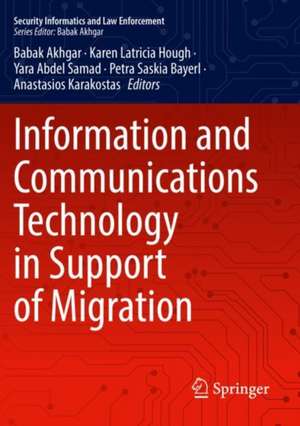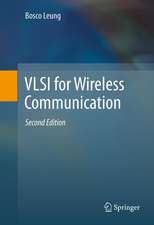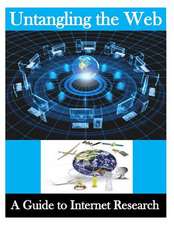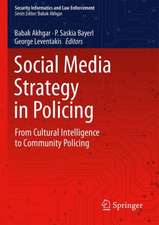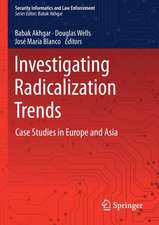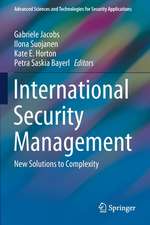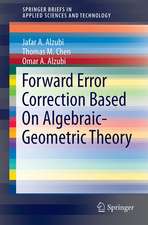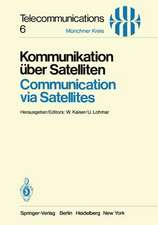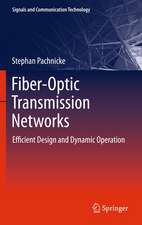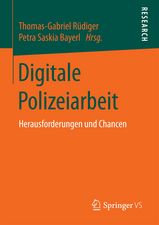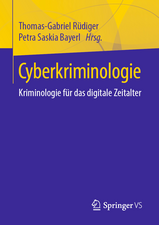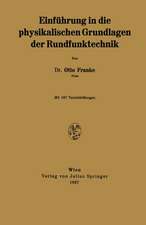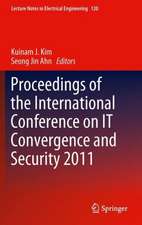Information and Communications Technology in Support of Migration: Security Informatics and Law Enforcement
Editat de Babak Akhgar, Karen Latricia Hough, Yara Abdel Samad, Petra Saskia Bayerl, Anastasios Karakostasen Limba Engleză Paperback – 2 iun 2023
This edited volume has been developed by the MIICT project, funded under the EU Horizon 2020 Action and Innovation programme, under grant agreement No 822380.
Provides a positive approach to the integration of migrants, asylum seekers, and refugees using Information and Communications Technology (ICT) solutions
Offers a strategic approach to providing digital services for migrants at an EU, national and local level Bridges the gap between academia and front-line practitioners’ work by providing theoretical, policy, ethical, and methodological recommendations
| Toate formatele și edițiile | Preț | Express |
|---|---|---|
| Paperback (1) | 525.34 lei 3-5 săpt. | +27.38 lei 6-12 zile |
| Springer International Publishing – 2 iun 2023 | 525.34 lei 3-5 săpt. | +27.38 lei 6-12 zile |
| Hardback (1) | 790.28 lei 3-5 săpt. | |
| Springer International Publishing – iun 2022 | 790.28 lei 3-5 săpt. |
Preț: 525.34 lei
Preț vechi: 632.93 lei
-17% Nou
Puncte Express: 788
Preț estimativ în valută:
100.52€ • 104.75$ • 83.23£
100.52€ • 104.75$ • 83.23£
Carte disponibilă
Livrare economică 13-27 martie
Livrare express 26 februarie-04 martie pentru 37.37 lei
Preluare comenzi: 021 569.72.76
Specificații
ISBN-13: 9783030932688
ISBN-10: 3030932680
Pagini: 394
Ilustrații: XXXI, 394 p. 35 illus., 27 illus. in color.
Dimensiuni: 148 x 210 x 23 mm
Greutate: 0.63 kg
Ediția:1st ed. 2022
Editura: Springer International Publishing
Colecția Springer
Seria Security Informatics and Law Enforcement
Locul publicării:Cham, Switzerland
ISBN-10: 3030932680
Pagini: 394
Ilustrații: XXXI, 394 p. 35 illus., 27 illus. in color.
Dimensiuni: 148 x 210 x 23 mm
Greutate: 0.63 kg
Ediția:1st ed. 2022
Editura: Springer International Publishing
Colecția Springer
Seria Security Informatics and Law Enforcement
Locul publicării:Cham, Switzerland
Cuprins
Introduction.- Part 1 – The relevance of ICTs in migration.- Minority rights.- Migration knowledge production and the shaping of perceptions of Europe.- Integrate services to integrate migrants.- Part 2 – Reviewing perspectives and experiences.- The Challenges and opportunities of ICT along the Road to Europe.- From a digital breach to a usage and positioning gap.- Developing migration focused ICT tools with marginalised groups.- ICTs and Migration.- The Challenges of co-design and co-creation for migrant integration.- Easing migrants’ access to public services.- Part 3 – Developing migration-related ICTs.- Micado Architecture.- The challenges of co-creation processes on developing ICT solutions for migrant inclusion.- Experiences from the development of ICT tools for and with migrants through NADINE platform.- Equity, Diversity and Inclusion in designing AI-based solutions for migrants integration: REBUILD project.- Skill matching for migrant guidance based on AI tools.- Personalisedinteraction or how we can improve migrants’ experience when using a digital companion through a mobile app.- Immerse Architecture.- Authoring tools for young migrants.- Part 4 – Legal, ethical and societal considerations.- Assessing the socio-economic, technological and political impact of ICT tools for migrant integration.- Protecting Migrants’ Data.- Shaping ICT policies for integrative and inclusive digital services.- Legal and Ethical Frameworks Applicable to Social Media Analytics in the Context of Migration.- The Legal Framework Applicable to the Design and Use of ICTs in Migrants’ Integration.- Conclusion.
Notă biografică
Professor Babak Akhgar is Professor of Informatics and Director of CENTRIC (Centre of Excellence in Terrorism, Resilience, Intelligence and Organised Crime Research) at Sheffield Hallam University, UK, and Fellow of the British Computer Society. He has more than 130 refereed publications in international journals and conferences on strategic information systems with specific focus on knowledge management (KM) and intelligence management. He is member of editorial boards of several international journals and has acted as Chair and Program Committee Member for numerous international conferences. He has extensive and hands-on experience in the development, management and execution of KM-projects and large international security initiatives (e.g., the application of social media in crisis management, intelligence-based combating of terrorism and organised crime, gun crime, cyber-crime and cyber terrorism, and cross-cultural ideology polarisation). In addition to this, he acts as technical lead in EU security projects (e.g., the EU H2020-project TENSOR on dark web). He has co-edited numerous books on Intelligence Management, for instance, Emerging Trends in ICT Security, Application of Big Data for National Security, Open Source Intelligence Investigation and Combatting Cybercrime and Cyberterrorism. Prof Akhgar is board member of the European Organisation for Security (EOS) and member of the Academic Advisory Board of SAS UK.
Dr Karen Latricia Hough obtained her doctorate in Social and Cultural Anthropology from the University of Oxford. She specialised in Refugee Studies and received many important awards for her research including the Vice Chancellorships’ Award and the Bagby Award at the University of Oxford. She has written evidence for the Home Affairs Commission and published a variety of articles in Oxford University Press, Franco Angeli, and Open Democracy. Her research focuses on the development of Asylum and Immigration policy, and she has worked as a researcher on several EU funded projects in the Russian Federation and Europe. She has taught various courses in Anthropology and Migration Studies at the University of Oxford, University of Oxford Brookes and the University of Salento. Karen is currently a research fellow at the Centre of Excellence in Terrorism, Resilience, Intelligence and Organised Crime Research (CENTRIC), Sheffield Hallam University, UK, working on two H2020- funded EU projects, ICT Enabled Public Services for Migration (MIICT) and Perceptions.
Yara Abdel Samad holds an MSc in information technology management. She specialises in e-government and e-governance. She developed a training module that has been taught at the Academy of ICT Essentials for Government Leadership at the United Nations Economic and Social Commission for Wester Asia (ESCWA). She was the Policies and Strategies Director at the Ministry of Digital Economy and Entrepreneurshipin Jordan. She developed various national ICT policies and strategies and published journal articles related to e-government and a variety of ICT related articles in Jordanian newspapers. She is currently a researcher at the Centre of Excellence in Terrorism, Resilience, Intelligence and Organised Crime Research (CENTRIC), Sheffield Hallam University (SHU). She is the project manager of ICT Enabled Public Services for Migration (MIICT), an H2020-funded EU project.
Professor Petra Saskia Bayerl is Professor of Digital Communication and Security at CENTRIC (Centre of Excellence for Terrorism, Resilience, Intelligence and Organised Crime Research), Sheffield Hallam University, UK. Her research interests lay at the intersection of human-computer interaction, organisational communication, and organisational change with a special focus on ICT innovations, privacy, and the management of transparency. She holds master’s degrees in psychology, linguistics and organizational dynamics from universities in Germany and the USA and a Ph.D. from Technical University in Delft, Netherlands. Her publications have appeared in international journals such as Communications of the ACM, MIS Quarterly and New Media and Society. She has further co-edited books on topics such as Open Source Intelligence, Application of Big Data for National Security and Community Policing.
Dr Anastasios Karakostas received the Degree in Computer Science and the PhD degree in Computer Science at the Aristotle University of Thessaloniki Greece. He is a Senior Researcher with ITI-CERTH. Currently, he is deputy coordinator and scientific manager of the H2020 Disaster Management projects aqua3S and beAWARE and deputy coordinator of the H2020 Factories of the Future project i4Q. Additionally he is technical manager in two H2020 projects regarding ICT solutions and Migration, namely MIICT and WELCOME. He has also participated in numerous European and national research projects and is the author of more than 60 publications in refereed journals and international conference. His research interests include decision support systems, semantic multimedia analysis, ontologies and semantic information modelling and reasoning. He has served as a reviewer in international Journals such as Computers and Education, IEEE Transactions on Learning Technologies and as Technical program committee in well reputed conferences and workshops such as CSCL, IEEE ICALT.
Dr Karen Latricia Hough obtained her doctorate in Social and Cultural Anthropology from the University of Oxford. She specialised in Refugee Studies and received many important awards for her research including the Vice Chancellorships’ Award and the Bagby Award at the University of Oxford. She has written evidence for the Home Affairs Commission and published a variety of articles in Oxford University Press, Franco Angeli, and Open Democracy. Her research focuses on the development of Asylum and Immigration policy, and she has worked as a researcher on several EU funded projects in the Russian Federation and Europe. She has taught various courses in Anthropology and Migration Studies at the University of Oxford, University of Oxford Brookes and the University of Salento. Karen is currently a research fellow at the Centre of Excellence in Terrorism, Resilience, Intelligence and Organised Crime Research (CENTRIC), Sheffield Hallam University, UK, working on two H2020- funded EU projects, ICT Enabled Public Services for Migration (MIICT) and Perceptions.
Yara Abdel Samad holds an MSc in information technology management. She specialises in e-government and e-governance. She developed a training module that has been taught at the Academy of ICT Essentials for Government Leadership at the United Nations Economic and Social Commission for Wester Asia (ESCWA). She was the Policies and Strategies Director at the Ministry of Digital Economy and Entrepreneurshipin Jordan. She developed various national ICT policies and strategies and published journal articles related to e-government and a variety of ICT related articles in Jordanian newspapers. She is currently a researcher at the Centre of Excellence in Terrorism, Resilience, Intelligence and Organised Crime Research (CENTRIC), Sheffield Hallam University (SHU). She is the project manager of ICT Enabled Public Services for Migration (MIICT), an H2020-funded EU project.
Professor Petra Saskia Bayerl is Professor of Digital Communication and Security at CENTRIC (Centre of Excellence for Terrorism, Resilience, Intelligence and Organised Crime Research), Sheffield Hallam University, UK. Her research interests lay at the intersection of human-computer interaction, organisational communication, and organisational change with a special focus on ICT innovations, privacy, and the management of transparency. She holds master’s degrees in psychology, linguistics and organizational dynamics from universities in Germany and the USA and a Ph.D. from Technical University in Delft, Netherlands. Her publications have appeared in international journals such as Communications of the ACM, MIS Quarterly and New Media and Society. She has further co-edited books on topics such as Open Source Intelligence, Application of Big Data for National Security and Community Policing.
Dr Anastasios Karakostas received the Degree in Computer Science and the PhD degree in Computer Science at the Aristotle University of Thessaloniki Greece. He is a Senior Researcher with ITI-CERTH. Currently, he is deputy coordinator and scientific manager of the H2020 Disaster Management projects aqua3S and beAWARE and deputy coordinator of the H2020 Factories of the Future project i4Q. Additionally he is technical manager in two H2020 projects regarding ICT solutions and Migration, namely MIICT and WELCOME. He has also participated in numerous European and national research projects and is the author of more than 60 publications in refereed journals and international conference. His research interests include decision support systems, semantic multimedia analysis, ontologies and semantic information modelling and reasoning. He has served as a reviewer in international Journals such as Computers and Education, IEEE Transactions on Learning Technologies and as Technical program committee in well reputed conferences and workshops such as CSCL, IEEE ICALT.
Textul de pe ultima copertă
The book provides a holistic review, presenting a multi-stakeholder, multi-disciplinary, international, and evidence-based approach to Information and Communications Technology (ICT) in migration. The book brings together different views and multifaceted responses to ICT-based migration management, examining their overlap, conflict, and synergies. The book is a major addition to the field, tackling important debates concerning humanitarianism and securitization in the reception of migrants, as well as exploring the role of digital technology in aiding migrant integration. The authors explore contentious areas such as the use of new technologies deployed on borders for migration management and border security under the umbrella of smart border solutions including drones, AI algorithms, and face recognition, which are widely criticized for ignoring the fundamental human rights of migrants. The research presented will depart from the euphoric appraisals that technology has made thingseasier for migrants and those who assist them, to critically examine the bane and boon, benefits and afflictions, highlighting the barriers, as well as the solutions, including several under-researched aspects of digital surveillance and the digital divide.
This edited volume has been developed by the MIICT project, funded under the EU Horizon 2020 Action and Innovation programme, under grant agreement No 822380.
This edited volume has been developed by the MIICT project, funded under the EU Horizon 2020 Action and Innovation programme, under grant agreement No 822380.
Caracteristici
Provides a positive approach to the integration of migrants, asylum seekers, and refugees using Information and Communications Technology (ICT) solutions Offers a strategic approach to providing digital services for migrants at an EU, national and local level Bridges the gap between academia and front-line practitioners’ work by providing theoretical, policy, ethical, and methodological recommendations
